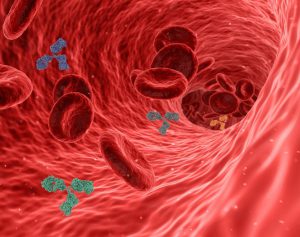These days, we’re all thinking about our health and immune systems, and if you’re an older adult, that probably goes double for you. But even before people of all ages were wondering whether they should be disinfecting their groceries, you’d probably been noticing that your immune system just wasn’t what it used to be. And now maybe you feel like you get sick more often than you did when you were younger, or that it takes longer for you to get back on your feet again – so is that all in your head? And what can you do to give your immune system the boost it needs as the cold and flu season hits us?
Is Your Immune System Not Quite What It Used to Be?

The answer to whether you’re just imagining a decline in your immune system is no, you’re not just imagining it. Your immune system – your body’s natural defense against illness and infection – does tend to get weaker with age. That’s actually the ironic thing about our increasing life expectancies: as we live longer and longer, we see more and more how our bodies decline with age, and our immune systems are no different. They take a hit with age, allowing more infections, diseases, and cancer to take hold; this tendency to lose some of our immunity as we age is known as “immune senescence.”
“Just as you probably can’t run as fast as you used to in your 20s, your immune system doesn’t work as well as it used to,” says Aaron E. Glatt, MD, chairman of the department of medicine at South Nassau Communities Hospitals.
While scientists aren’t quite sure why this happens, they have observed that the increased risk of infections (and of dying of respiratory illnesses like the flu, pneumonia, and Covid-19) for older adults is linked with a decrease in T cells (which attack other, illness-causing cells). This is possibly due to the normal atrophying of the thymus gland with age, which leads to it producing fewer T cells to fight off infection. There is also some speculation that our bone marrow becomes less efficient at producing the stem cells that help create the cells of the immune system, or that inflammation and infections chip away at our immune systems over time.
Whatever the reason, it’s clear that the following three things happen as you age:
- Your body doesn’t respond as well to vaccines – Again, when you’re older, you don’t make as many T cells, and most vaccines need new ones to work. But that doesn’t mean you should skip your vaccines! Despite the reduction in efficacy, vaccinations for influenza and S. pneumoniae have significantly lowered the rates of sickness and death in older people when compared with no vaccination.
- You become more susceptible to illness – Not only do you have fewer cells that fight infection, the ones you do have also don’t communicate as effectively with each other, meaning they might not be as quick on the uptake when it comes to reacting to germs (hey, it happens to the best of us!)
- You recover from illness, injury, and infection more slowly – You also produce fewer white blood cells as you age, which can slow down recovery from illness.
What Can You Do?
While all of the above is true, and can mean a bit more worry as we approach the germy winter season, you don’t have to take it all lying down (in bed, with a box of tissues at hand). While there is no magic cure-all, you can try the following things to keep your aging immune system as strong as possible for as long as possible:
Get Your Z’s

Getting enough sleep is important at every age, but as you get older, it becomes even more important since it helps improve brain function, concentration, and memory. But sleep is also important for keeping your immune system strong: according to Gisele Wolf-Klein, MD, ““Research clearly shows that too little sleep – or poor-quality sleep – lowers immunity, even in young healthy people.” Aim for at least 7-9 hours of sleep a night; remember to keep your bedroom dark, cool, and screen-free, try not to take excessive naps, and limit caffeine consumption to get your optimal amount of sleep.
Work on Your Stress Levels
A bit of short-term stress probably isn’t going to affect your body, but chronic stress can actually take a toll on your immune system. When under stress, your body increases the production of the stress hormone, cortisol, which has the side effect of limiting bodily functions that aren’t essential in a fight-or-flight situation. That means that constantly producing extra cortisol could lower your immune system response, and make you more susceptible to illness; not only that, but you might find yourself sleeping and eating poorly if you’re under constant stress, which can also work against you. Try to find ways to relax that you enjoy, or add meditation, breathing, or yoga into your life, and remember to set limitations and say “no” when you need to focus on you.
Eat Healthy, Including Immune-Boosting Foods
There isn’t one single food you can eat, or diet you can follow, to improve your immunity, but it is important to eat a healthy, varied diet full of vitamin and mineral-rich foods, like fresh fruits and veggies. You should especially look for dark, leafy greens and anything in the red, yellow or orange family, which are loaded with immune-boosting vitamin C and antioxidants. Some researchers do suggest trying to incorporate the following immune-boosting foods:

- Citrus fruits
- Watermelon
- Ginger
- Spinach
- Greek yogurt
- Chicken
Exercise and Maintain a Healthy Weight
Some researchers believe that excess weight – especially abdominal fat – triggers inflammation, which not only increases your risk of heart disease and diabetes, but also puts stress on your immune system. Eating a healthy, varied diet as discussed above can also go a long way toward maintaining a healthy weight, as can moving your body more, helping to keep your immune system working at its best. Research also suggests that exercise helps cells move more freely, which helps them do their job better.
Quit Smoking
The chemicals in cigarettes are known to damage lung tissue and increase the risk for cancer, but they can also cause respiratory illnesses such as the flu, bronchitis, and pneumonia. There are so many good reasons for quitting, so if you smoke, talk to your doctor about the best way for you, whether it’s a gum, a patch, a prescription medication, counselling, or a combination of these methods.
Get Outside
Spending a little time out in the sunshine can help to boost your vitamin D levels, which can help strengthen your immune system; if your vitamin D levels are really low, your doctor can prescribe supplements or recommend an over-the-counter supplement. Just remember not to spend too much time in the strong sun, so you can avoid sunburns and excessive amounts of UV radiation, which can cause cancer.
Stay on Top of Your Health
If you’re living with chronic conditions like diabetes or arthritis that affect your overall functioning and make you feel less than tip-top, make sure to follow all of your doctor’s recommendations for keeping these conditions under control. Again according to Dr. Glatt, “Keeping illnesses like diabetes well-controlled takes less of a toll on your immune system.”
Get Vaccinated!
Yes, we did point out that vaccines are not as effective for older adults, but they are still an extremely important way to lower your risk of illnesses that can be much more serious for seniors, like flu and pneumonia – not to mention Covid-19. And they have been proven to significantly lower risks of infections in older adults when compared to taking no vaccine at all. Talk to your doctor about all of the vaccines that you should be getting, and find out how many doses you need of each one, as well as whether they are a one-off or an annual necessity.
There’s no denying that aging takes a toll on your body, and your immune system can feel like just another casualty as you get older. But, while you can’t reverse the aging process, you can take steps to keep your immune system as strong as possible – so, when prepping for the winter months ahead, don’t forget to include boosting your immune system on your list of things to do!
